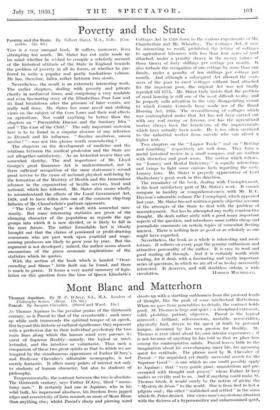Poverty and the State
Poverty and the State. By Gilbert Slater, M.A., D.Sc. (Con- stable. 12s. 6d.) Tins is a very unequal hook. It suffers, moreover, from attempting too much. Mr. Slater has not quite made up his mind whether he wished to compile a scholarly account of the historical attitude of the State in England towards the problem of poverty in all its forms, or whether he pre- ferred to write a popular and partly tendentious volume. He has, therefore, fallen rather between two stools.
Nevertheless, the result is an extremely interesting work. The earlier chapters, dealing with poverty and private charity in mediaeval times, and comprising a very readable and even fascinating story of the Elizabethan Poor Law and its final breakdown after the pressure of later events, are really well done. Mr. Slater has some novel and striking views on the subject of the Corn Laws and their real effects on agriculture. Nor could anything be better than the chapters on " Preventible Disease and the Sanitary Idea " and " The Care of the Child." The only important omission here is to be found in a singular absence of any reference
to Disraeli and his influence. Sanitas sanilatum, oinnia swains ! "—was not this phrase worth remembering ?
The chapters on the development of medicine and the relations between the medical profession and the State arc not altogether satisfactory. As an historical review they are somewhat sketchy. The real importance of Mr. Lloyd George's great Insurance Act is underestimated, nor is there sufficient recognition of the same statesman's second great service to the cause of national physical well-being by the formation of the Ministry of Health and the tremendous advance in the organization of health services, local and national, which has followed. Mr. Slater also seems wholly to misunderstand the effects of the Local Government Act, 1928, and to have fallen into one of the common clap-trap fallacies of Mr. Chamberlain's partisan opponents.
" The Cure of the Aged " is dealt with somewhat sum- marily. But some interesting statistics are given of the changing character of the population as regards the age groups into which it is now divided, or is likely to fall in the near future. The rather formidable fact is clearly brought out that the claims of pensioned or profit-drawing consumers who are past work upon youthful and wage- earning producers are likely to grow year by year. But the argument is not developed ; indeed, the author seems almost unconscious of the grave economic implications of the statistics which he quotes.
With the section of the book which is headed " Over- crowding and Slums " little fault can be found, and there is much to praise. It forms a very useful summary of legis- lation on this question from the time of Queen Elizabeth's
Cottages Act in 1339 down to the various experiments of Mr. Chamberlain and Mr. Wheatley. The Cottages Act, it may be interesting to recall, prohibited the letting of cottages to agricultural labourers with less than four acres of land attached, under a penalty (heavy in the money values of those times) of forty shillings per cottage per month. It also forbade the occupation of one cottage by more than one family, under a penalty of ten shillings per cottage per month. And although a subsequent Act allowed the over- seers of the poor to erect cottages without land attached for the impotent poor, the original Act was not finally repealed till 1775. Mr. Slater truly insists that the problem of rural housing is still one of the most difficult to-day. and he properly calls attention to the very disappointing extent to which County Councils have made use of the Rural Housing Act, 1926. The reconditioning of cottages which was contemplated under that Act has not been carried out with any real energy or fervour, nor has the agricultural worker always been the beneficiary of the improvements which have actually been made. Ile is too often sacrificed to the industrial worker from outside who can afford a higher rent.
Two chapters on the " Liquor Trade " and on " Betting and Gambling" respectively are well done. They form a useful historical review in a small compass, and are written with discretion and good sense. The section which follows, on " Lunacy and Mental Deficiency " is equally interesting, and brings to light some curious facts regarding the early Lunacy laws. Mr. Slater is properly appreciative of Lord Shaftesbury's great work in this direction.
The remainder of the book, dealing with Unemployment, is the least satisfactory part of Mr. Slater's work. It cannot compare in lucidity or comprehensiveness with Mr. R. C. Davison's admirable volume The Unemployed, which appeared last year. Mr. Slater has not written a purely objective account of the attempts of the State to deal with the problem of unemployment. Nor has he attempted any really constructive thought. He deals rather airily with a good many important aspects of the question, and introduces sonic rather cheap and journalistic comments on certain topics of somewhat fleeting interest. There is nothing here as good or as scholarly as one might have expected.
Nevertheless, the book as a whole is interesting and meri- torious. - It reflects on every page the genuine enthusiasm and attractive personality of the author. It is easy to read and good reading all through. And it is certainly worth while reading, for it deals with a fascinating and vastly important series of questions, in which we are all of us to-day necessarily interested. It deserves, and will doubtless obtain, a wide
















































 Previous page
Previous page